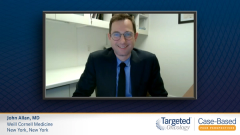
The Future of Chronic Lymphocytic Leukemia Treatment
John Allan, MD, looks to the future of chronic lymphocytic leukemia treatments.
Episodes in this series

John Allan, MD: Another question that is frequently posed is, what does the future hold and where is the field of CLL going? Today, there's a lot of agents within a class. It's less about development in the frontline setting, at least the new drugs, because these drugs that we currently have are just so good. It's going to be hard to knock them off and top them.
What we're focusing on is minimizing toxicity and now potential combination approaches. We are trying to go completely infusion-free or oral chemotherapy-free approaches with ibrutinib- or venetoclax-based therapies, plus or minus anti-CD20. All of the BTK inhibitors that are FDA approved, the acalabrutinib and as well as zanubrutinib, which got approvals outside of CLL right now, have combination studies ongoing with venetoclax, as well as plus or minus anti-CD20. We'll go into this next wave of research understanding whether these oral options are just as good as sequential monotherapy options.
If we can utilize MRD [minimal residual disease] to help identify patients that we can pull back treatment on comfortably, and/or utilize MRD to identify patients that we either extend treatment on, and/or add on therapies to. I think that's where the next wave of research is going. It's a little less glamorous because it's not looking at new drugs and new mechanisms of actions, at least in that frontline setting, but it's really looking at how to optimize the drugs that we currently have. There's several clinical trials that are being done. CAPTIVATE [Phase 2 CAPTIVATE results of ibrutinib (ibr) plus venetoclax (ven) in first-line chronic lymphocytic leukemia (CLL)] is a large phase 2 study incorporating MRD results in ibrutinib-venetoclax all oral-based combination, both in a response adapted approach and a fixed-duration approach for everyone. GLOW [Phase 3 GLOW Trial of Ibrutinib and Venetoclax as First-Line CLL Therapy] was a large phase 3 study in older patients looking at ibrutinib-venetoclax, which has reported out primary end point data this past summer at EHA [European Hematology Association].
That's going to be encouraging to see what happens over time with that study. There are several other large clinical trials that are going to be reaching out with targeted agent approaches against chemoimmunotherapy approaches by the German CLL study group. I think we will know best how to do this, and in several years, from this point on and looking forward, to utilizing these potential all-oral chemotherapy-free regimens for our patients, specifically those very high-risk. I envision a combination strategy in the frontline setting, plus or minus some maintenance, depending on which potential risk factors they might have.
John Allan, MD: I always get asked what some key takeaways are when managing your patients with CLL in the era of these targeted agents. I think education to the patient can go a long way, education about their biology, education about these drugs, and potential toxicities. Patients with CLL, for the most part, are very well-educated about their disease because they have time to read up about it. They have time to go to the chat rooms. They have time to identify other people with this disease in their community and/or at conferences and so on.
Patients with CLL get this information and talk to each other. I think we as physicians can provide them this information that they want. At the same time this prepares us for any treatment decision that may need to be made, really predicting what the future may hold, and when we need to start worrying about our patients.
I think education once you start treatment, education about side effects can go a long way. We need to be preparing patients to know what to expect, be it a rash, diarrhea, or atrial fibrillation, or when to talk to you about a palpitation that they may have had, or the headache that may occur with acalabrutinib and maybe even some of these other BTKi inhibitors. Education goes a long way in terms of that, and I think the space moves quickly. We should be looking at how to salvage some of these double-refractory patients will be an interesting looking at these new drug classes as they advance and mature in their clinical trial endeavors. We should be seeing what these outcomes are and exploring whether we can have even further small molecules to potentially offer our patients as they progress on these drugs.
Transcript Edited for Clarity
Initial Presentation
- A 67-year-old man presented to PCP with complaints of fatigue and night sweats
- PMH: patient takes OTC antiacid tablets a few times a week for a “sensitive” stomach
- PE: Enlarged mobile lymph nodes bilaterally (~1.5 cm), no palpable spleen or liver
- Laboratory findings:
- WBC; 102 X 109/L
- Lymphocytes; 79 X 109/L
- Hb; 11.4 g/dL
- Platelets; 180 X 109/L
- ANC; 1,900/mm3
- LDH 1470 U/L
- Cytogenetics; del(11q), IgVH-unmutated
- beta2M, 3.0 mg/L
- Rai Stage I
Treatment Plan
- Patient was started on ibrutinib









































